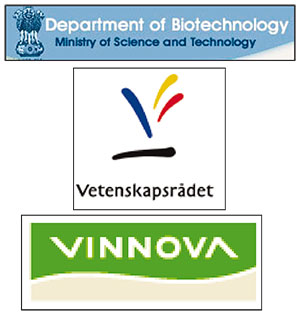Postal address: Spiber Technologies, KTH, School of Biotechnology, AlbaNova University Center, SE-106 91 Stockholm, SWEDEN
Visiting address: Roslagstullsbacken 21
Web page: http://www.spiber.se
Contact person: Associate Professor My Hedhammar, R&D Director at Spiber – also working at the Department of Anatomy, Physiology and Biochemistry, Swedish University of Agricultural Sciences, phone: +46 (0)739 05 3513
Spiber Technologies is a start-up biotechnology company. We see ourselves as leaders in recombinant spider silk development and production. The company was founded in 2008. Its technologies are based on successful research on spider silk conducted at the Swedish University of Agricultural Sciences (SLU). The company is privately owned.
South Asia related research
 In December 2013, Spiber Technologies was selected for funding from the Strategic Indo-Swedish Cooperative Innovation Programme, jointly administered by The Department of Biotechnology, Government of India (DBT); the Swedish Governmental Agency for Innovation Systems (VINNOVA); and the Swedish Research Council (SRC). The project, to be carried out in collaboration with the Indian Institute of Technology (IIT) Guwahati, is entitled ”Silk2Heal – Developing an Antimicrobial Wound Patch with Wound-healing Ability for Diabetic Foot Ulcers”, and it receives SEK 5 m. for the period 2014 – 2017.
In December 2013, Spiber Technologies was selected for funding from the Strategic Indo-Swedish Cooperative Innovation Programme, jointly administered by The Department of Biotechnology, Government of India (DBT); the Swedish Governmental Agency for Innovation Systems (VINNOVA); and the Swedish Research Council (SRC). The project, to be carried out in collaboration with the Indian Institute of Technology (IIT) Guwahati, is entitled ”Silk2Heal – Developing an Antimicrobial Wound Patch with Wound-healing Ability for Diabetic Foot Ulcers”, and it receives SEK 5 m. for the period 2014 – 2017.
The project deals with chronic wounds, a health problem that influences millions of people. Wound infection is one of the causes for why it takes such a long time for a wound to heal. Spiber Technology has together with a collaborator at the Indian Institute of Technology Guwahati come up with a concept to increase healing and reduce bacterial load in the wounds.
The project leaders have been Ekaterina Medvedeva, Marketing Director, M.Sc. in Molecular Biotechnology Engineering at Spiber; and Assistant Professor Biman Mandal at the Department of Biotechnology, IIT Guwahati. The other partners in the project include Prof. Hedhammar; PhD candidate Naresh Tatikonda; and Linnea Nilebäck. More information about the project. A Call for the programme was announced in the spring 2013, and decisions were taken in December 2013. Altogether five Indo-Swedish projects in the field of Health and Disease prevention were selected to receive funding. Full information about the selection.
The goal of the programme is to support long-term Indo-Swedish research and innovation collaboration in the field of Health. Indian and Swedish industry and researchers in both private and public sectors were invited to submit joint project applications for collaborative research and innovation projects. The approach is to establish and strengthen collaborative industry and research networks between India and Sweden by funding joint research and innovation projects, exchange visits, demonstration and proof of principle.
 Project abstract: Diabetes is a metabolic disease that affects 371 million people worldwide. Foot ulcer is one of the most severe complications, affecting up to 25% of all diabetic patients during their life time. A majority of the ulcers are infected. An untreated or improperly treated infection may result in amputation and even patient death. The most common treatment today is systemic administration of antibiotics. Due to the emergence of widespread antibiotic resistance, search for new bactericidal agents is highly demanded, especially for local treatments of infections such as in diabetic foot ulcer.
Project abstract: Diabetes is a metabolic disease that affects 371 million people worldwide. Foot ulcer is one of the most severe complications, affecting up to 25% of all diabetic patients during their life time. A majority of the ulcers are infected. An untreated or improperly treated infection may result in amputation and even patient death. The most common treatment today is systemic administration of antibiotics. Due to the emergence of widespread antibiotic resistance, search for new bactericidal agents is highly demanded, especially for local treatments of infections such as in diabetic foot ulcer.
The consortium goal is to develop a wound patch with following features:
• Antimicrobial activity
• Wound healing properties
• Strength and elasticity as human skin
• Cost effective
• Biodegradable
The aim is to meet these requirements by bringing together two silk technologies: matural non-mulberry Indian silk (IITG-team) and recombinant spider silk, Spiber™ (SLU/ST-team). Indian silk will be used as cost efficient bulk material, while Spiber™ will incorporate antimicrobial activity and wound healing functions. Both silks are biodegradable, and their mechanical strength and elasticity resemble those of skin.
The project will be run in three stages:
1) Separate biomaterial development and evaluation (in vitro), delivering several variants for combinatory studies
2) Combinatory biomaterial studies (in vitro), resulting in selection of one optimized material for animal studies
3) Animal study (in vivo), where we will evaluate the biocompatibility of the combinatory biomaterial and its antimicrobial and wound healing functions
The project will be supported by a business case, project management between the sites, and a plan for knowledge dissemination